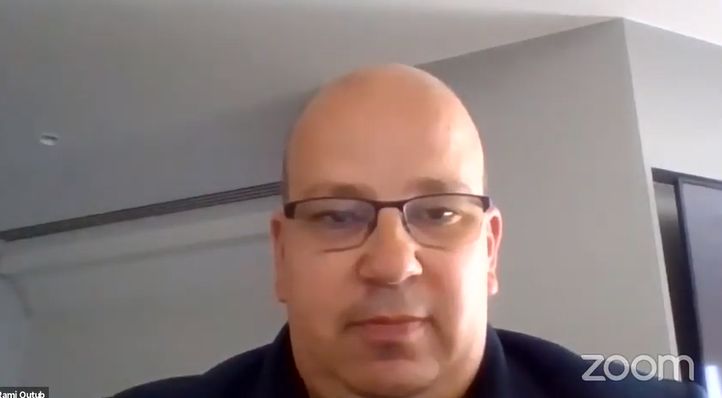São Paulo – Palestine is a producer and exporter of pharmaceutical products. In addition to supplying international markets with its products, the country has space for foreign investors in this industry. The president of the Palestinian Pharmaceutical Union, Rami Qutub (pictured above), spoke on the subject at the 1st Brazil-Palestine Business Seminar – Partnerships and Opportunities in the Food and Pharmaceutical Sectors, which took place this Wednesday (23) online and got some 400 viewers from Brazil and Palestine.
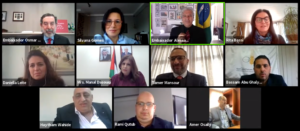
Palestine exports medication to 22 countries in Europe, Africa, the Middle East, and Asia [former Soviet republics – CIS]. Qutub said that only one Palestinian company sells to Latin America and emphasized that the Pharmaceutical Union is “knocking at the region’s door” to make way for Palestinian products.
In addition, he discussed specific areas of the Palestinian pharmaceutical industry that need investments and can receive foreign companies. “There are great investment opportunities, for example, in cancer drugs. We don’t have any Palestinian company with the necessary technology to manufacture these drugs,” said Qutub.
Palestine also imports pharmaceutical inputs. “Another area that we can develop is raw materials. Today, we import from East Asia, and I know that in Brazil and Latin America, we can obtain these inputs, which are very necessary for Palestinian industry. We are facing this issue of lack of raw material, and we want to offer the best medicine for the Palestinian population,” concluded Qutub.
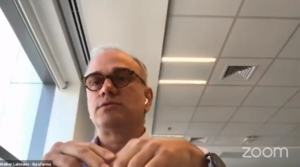
The executive director of Eurofarma, Walker Lahmann, also participated in the event. According to him, the Brazilian pharmaceutical market value is approximately USD 20 billion, having around 200 pharmaceutical companies producing or selling medication in Brazil, and national companies have a relevant production. He emphasized that the country manufactures original and generic medicines, with over 6,000 different drugs being sold in the country today in multiple areas.
“It is a market that has been growing between 10% and 15% a year and, in addition to the production of drugs, we also have innovation in Brazil. Among the innovations, we have the development of inputs; as Mr. Qutub mentioned, it could be important. It is not a very large production, but we do have it, and this can be a source of dialogue with Palestine,” said Lahmann.
Another area that Lahmann showed interest in was oncological drugs. “Regarding investments, perhaps the oncology area could be interesting since production does not exist in Palestine. These are drug types that are increasing their sales with the aging of the population, so investment in the production of this type of medicine might be attractive,” he said.
Eurofarma is a Brazilian company present in 20 countries in Latin America, Lahmann highlighted. “In other words, we started making investments in Latin America, due to the geographic proximity, the linguistic similarity,” he said, emphasizing he is open to investing in Palestine.
“We want to understand how regulatory issues are in Palestine because they can be limiting for any import or export of medication. Without a doubt, we are interested in investing, importing, and exporting medicines to Palestine, establishing this trade flow. We have our doors open, and I am at your disposal to start this dialogue,” he said.
Food
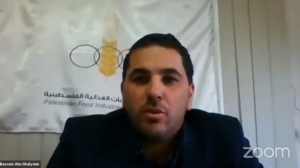
The president of the Palestinian Food Industries Union (PFIU), Bassam Abu Ghalyuon, informed that the Arab country exports to 70 nations worldwide and could export to all of them, following the needs of international consumers. He wants to strengthen cooperation with Brazil in the food sector.
“We want exchanges in the science and technology area between Brazil and Palestine, and that Palestinian students can acquire experience in Brazilian institutions. We want to strengthen the relationship between the chambers of commerce to facilitate this exchange,” he said.
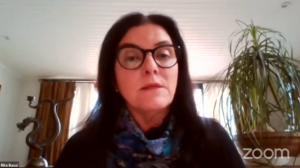
He also called for the opening of the Brazilian market to Palestinian products, mainly dates, olives, and medicinal plants. “Several products can be offered to the Brazilian consumer. We want to facilitate the export of products from the Gaza Strip to strengthen the Palestinian economy further,” he said. He stated that any investment in Palestine is welcome, and the country is ready for cooperation.
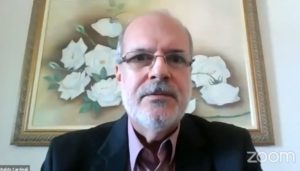
The president of the Brazilian Association of Olive Oil Producers and Importers (OLIVA), Rita Bassi, said the Brazilian market has space for olive oil from Palestine. “Importing olive oil into Brazil is not very bureaucratic; we have rules with the Ministry of Agriculture, there are specifications, but there is space for Palestine to bring these olive oils to Brazil,” she said. Bassi said that about 52% of the Brazilian population uses olive oil in their cooking. “We are available to industries that need information and support,” she told the Palestinians.
The economic analyst of the Economics and Development Section of the São Paulo General Store and Warehouse Company (CEAGESP), Ubaldo Cardinali, also participated in the meeting. He explained that CEAGESP receives 110 tonnes of food from the Arab world per year, which is a small amount compared to this market’s potential and the total sold by CEAGESP (1.6 million tonnes of fruit, on average, per year). The leading Arab food products sold at CEAGESP are dates, raisins, apricots, and prunes.
Overview
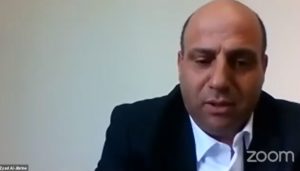
The Palestinian Federation of Industries (PFI) council chairman, Bassam Alwalweel, emphasized that Palestine wants to foster and strengthen economic ties with Brazil. “We have 16 federations of industries in Palestine, in food, gold, medicine, among other sectors, and we have the capacity and potential to export to Brazil, we know it is a distant country, but in our hearts, we are very close,” he said. Alwalweel also wants investment by Brazilian industries in Palestine, mainly in agribusiness.
Palestine Trade Center (PalTrade) board member and Al-Jebrini Dairy & Food Industry Company’s office commercial head, Zyad Al-Jebrini, sees exports as an essential step in strengthening the Palestinian economy. “We are ready to build partnerships with Brazil. We want to obtain incentives for bilateral trade and see Palestinian companies in various international markets,” he said.
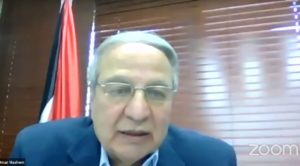
The president of the Federation of Palestinian Chambers of Commerce, Industry and Agriculture (FPCCIA), Omar Hashem, stated he wants to endeavor for mutual investments, despite the current circumstances imposed by the pandemic. “We want to encourage imports from friendly countries, not through Israeli occupation; we want independence from Israel and direct import from the Brazilian market,” he said. The director of the Chamber of Commerce and Industry of Hebron, Tareq Tamimi, also participated and spoke on the commercial exchange with Brazil.
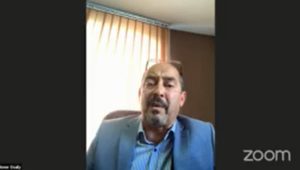
The president of the Palestinian Businessmen Forum (PBFORUM), Amer Osaily, stated that the forum represents Palestinian businesspeople in their interests and wants to build relationships with local and international investors. “We want dialogue and exchange of experiences, I want us to have direct businesses without Israeli interference, I hope to involve Latin America in this project, we have great potential, we can build partnerships between the private sector in Palestine and Brazil, we can eliminate the hurdles to more effective relations between our countries,” he said.
The virtual event was held by the Arab Brazilian Chamber of Commerce (ABCC) in partnership with the Palestinian Ministry of Economy, the Embassy of Palestine to Brazil, and the Brazilian Representation Office in Ramallah. One of the seminar’s moderators, the secretary-general of the ABCC, Tamer Mansour, said that after the pandemic, business missions to Palestine could be carried out and emphasized the importance of the Mercosur-Palestine free trade agreement coming into effect. The New Business director at the ABCC, Daniella Leite, and the Marketing & Content director at the institution, Silvana Gomes, moderated the virtual event along with Mansour. Brazilian and Palestinian authorities attended the seminar (read the article below).
Read more on the webinar:
Palestine wants to attract Brazilian investment
Watch the full event:
Translated by Elúsio Brasileiro



